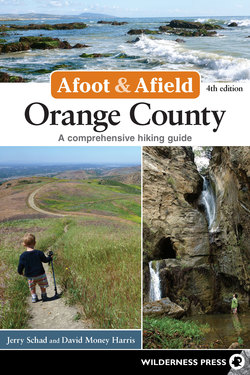Читать книгу Afoot and Afield: Orange County - Jerry Schad - Страница 26
На сайте Литреса книга снята с продажи.
Оглавлениеtrip 3.4 El Moro Canyon Loop
Distance 8 miles (loop)
Hiking Time 4½ hours
Elevation Gain 1,400’
Difficulty Moderately strenuous
Trail Use Cyclists, equestrians
Best Times October–May
Agency CCSP
Permit CCSP parking fee required
DIRECTIONS Crystal Cove State Park’s visitor center and backcountry trailhead is located just east of the Pacific Coast Highway (Highway 1), 2 miles north of Laguna Beach and 3 miles south of Corona del Mar. The entrance driveway is well marked, and a traffic light has been installed here for safety. After passing El Moro School, don’t take the main road that veers right toward the entrance station. Instead, continue straight to the parking area by the ranger station, where you pay your day-use fee.
On this grand, looping tour of the Crystal Cove backcountry, you’ll enjoy wide-ranging views from the spine of a prominent ridge along the way up, and you’ll admire upper El Moro Canyon’s fine oak woodlands on the way back down.
From the ranger station parking lot, take the dirt road leading east (No Dogs Road) toward a dry, scrub-covered ridge. After you climb a little, and if the morning marine-layer clouds have evaporated, fine views will open up of lower El Moro Canyon, the surrounding hills, and the blue ocean. Hawks and ravens soar on the updrafts generated on the sun-warmed slopes.
After 0.9 mile, the Poles Trail (a powerline road) on the right drops straight down into El Moro Canyon. Stay left and proceed generally north along the ridgeline. At the next intersection (1.5 miles), turn right on the West Cut-Across road. Descend only 0.2 mile, and then turn left on Rattlesnake Trail. It contours around a steep ravine (Deer Canyon), then climbs to the nose of the ridge between El Moro and Deer Canyons and ascends the steep rocky slope. All but the most gnarly cyclists hike-a-bike on this stretch.
As you approach an 844-foot high point on the ridge, the hike takes on a wilder character. The narrow trail passes delicately sculpted outcrops of sandstone. The native coastal sage scrub vegetation crowding the trailside exudes a warm, spicy odor. In spring, the colorful blooms of sticky monkeyflower, goldenbush, and paintbrush play counterpoint to the muted greens of the sages, buckwheat, laurel sumac, and lemonade berry. Two kinds of cacti appear: common coastal prickly pear cactus and the somewhat uncommon coastal cholla cactus, whose easily detached bristling joints may snag the skin, clothing, or shoes of careless passersby.
Fern grotto in El Moro Canyon
At one point along the ridge, most of the near and far suburban landscapes are temporarily veiled from sight by intervening ridges; for a moment, you can picture southern Orange County as it was about a century ago. On clear days, Mount San Antonio (Old Baldy) pokes up behind a nearby ridge to the north, and Santa Catalina Island seems to float out at sea like a mountain range cast adrift from the mainland.
Up a little farther, join the Redtail Ridge fire road, and you can look down upon Deer Canyon trail camp nestled in a grove of sycamores in the shallow canyon to your left. Still farther up the ridgeline, a gate across the road marks the boundary between the state park and the Laguna Coast Wilderness Park. Shy of this gate, however, you pick up the narrow Fenceline Trail on the right leading southeast toward El Moro Canyon, parallel to the boundary fence. After 0.4 mile on this trail, you join a road coming in from the left. Keep straight momentarily, and turn left at the next junction to take the more scenic “Elevator Trail” east-side descent into upper El Moro Canyon, rather than the less scenic west-side descent called Slow ’n Easy Trail.
A steep (average 20% for 0.3 mile) grade follows, the bane of mountain bikers and hikers traveling either up or down. But afterward, you can let gravity repay you in a gentle way as you make a much more gradual descent along the bottom of El Moro Canyon.
Upper El Moro Canyon is far and away the most beautiful attraction in the park’s backcountry. You stroll past thickets of willow, toyon, elderberry, and sycamore, all brightly illuminated by the sun; then suddenly plunge into cool, dark, cathedral-like recesses overhung by the massive limbs of live oaks. In one such recess, several shallow caves, adorned with ferns at their entrances, pock a sandstone outcrop next to the road. Prior to the establishment of the California missions, coast-dwelling Indians gathered acorns, seeds, and wild berries in this canyon. These foods, coupled with the abundant marine life nearby, provided a balanced and healthy diet.
Continue down El Moro Canyon to the trailhead at its mouth, then veer right onto the trail ascending the bluff back to the visitor center.
